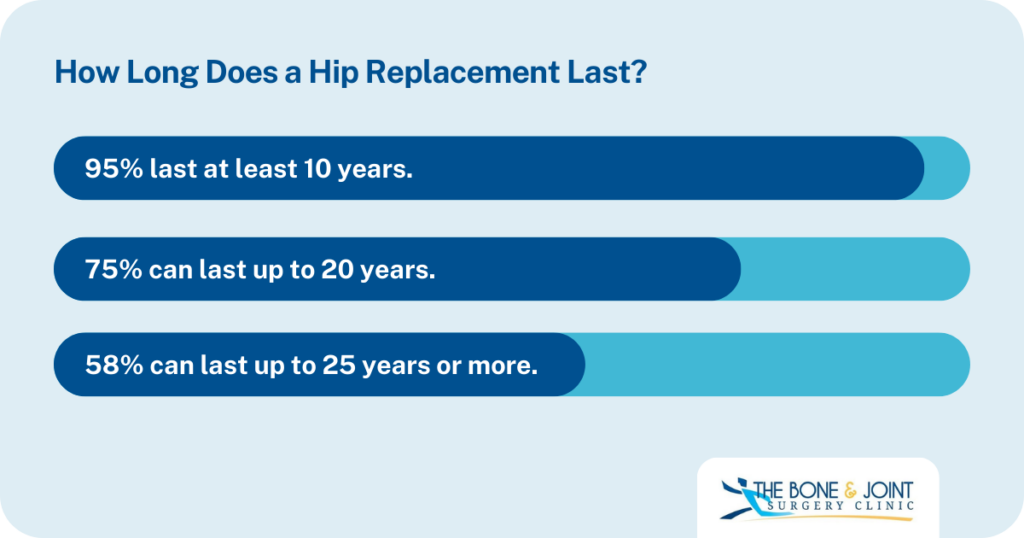A Lifespan of Relief: How Long Does a Hip Replacement Last?
You have been suffering from pain in your hip for years, preventing you from enjoying activities you once loved. Even a simple walk around the neighborhood has become unbearable, and sports are out of the question.
Then you found relief with a hip replacement. But how long does a hip replacement last? Will it be reliable through the decades or will you need to schedule another one sooner than you’d prefer?
Hip replacement is one of the most successful surgeries in medical history. The longevity of a hip replacement depends on a number of factors, including age, the material used, and the underlying reason for the surgery.
We know our patients may be wondering if they’ll have to undergo this procedure again, and we want to provide the answers to your FAQs.
How Durable Are Hip Replacements?

Can My Hip Replacement Last 30 Years?
It’s possible. As we mentioned earlier, it’s not unusual for hip replacements to last more than 25 years. However, a lot of this depends upon how well you follow your orthopedic surgeon’s advice and how you take care of yourself and your hip.
What Factors Influence How Long a Hip Replacement Lasts?
After you’ve had a hip replacement, there are certain things you should do to help ensure it lasts as long as possible:
- Avoid high-impact sports
- Follow all advice from your rehabilitation team and orthopedist in Raleigh
- Take care of yourself: maintain a healthy weight through diet and approved exercises
Because younger patients tend to be more active, their hips undergo more stress than those of older patients, so this could affect how long a hip replacement lasts.
What Are the Signs of a Hip Replacement Wearing Out?
If you have undergone hip replacement surgery in your younger years, there is a possibility that the artificial joint may wear out over time. For instance, if you have had a hip replacement at the age of 40 and about 50% of hip replacements last for 25 years, the joint may start showing signs of wear and tear when you turn 65.
However, every patient is different, and we personalize each care plan according to their individual situation.
Some signs of a hip replacement wearing out include:
- Pain in your hip, groin or thigh
- Pain when walking
- Difficulty standing in place
- Problems maintaining balance
- Feeling unstable, like the hip is “giving out”
If you’re experiencing any of these signs, we encourage you to schedule an appointment with us right away.
How Many Hip Replacements Can I Have?
There is no set number of times that a hip can be replaced. Often, it can be replaced or revised as needed. However, there are factors that can prevent additional hip replacement surgeries. These include:
- Extreme bone loss
- Consistent infection
- Poor patient health
You should also be aware that each additional replacement requires more intensive rehabilitative therapy and recovery may take longer.
For Relief From Hip Pain, Trust Our Board-Certified Experts at the Bone Joint Surgery Clinic
We take a conservative approach to medicine. This means that we only recommend surgery when other treatments have not been successful. For our patients who need hip replacements, the procedure has life-changing effects, transforming their lives and giving them freedom from chronic pain.
Convenient Locations With a Tradition of Excellence
As one of Wake County’s oldest and most well-known orthopedic practices, we have dedicated ourselves to patient-centered care for almost 50 years. We have in-house physical therapy services coupled with personalized care from our fellowship-trained physicians who are leaders in their field.
Is a hip replacement the right choice for you? Contact us for an appointment and we’ll be happy to discuss your care with a plan tailored to fit your needs.
The information in this article and the other articles on this website is for educational purposes only and is not intended as medical advice. If you have questions or concerns, please contact your healthcare provider.




